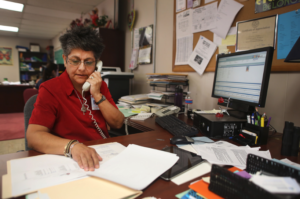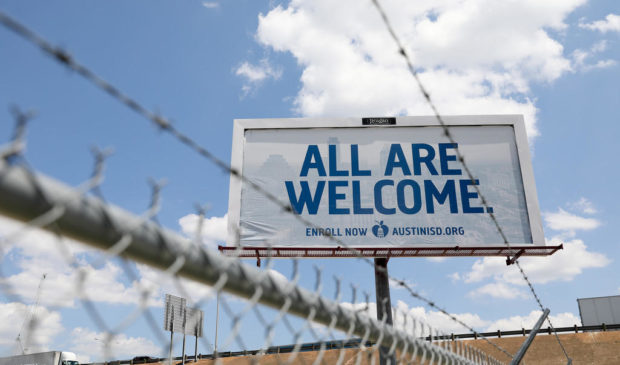As fear rises among undocumented community, Austin ISD reminds families schools are a safe place
Friday, August 3, 2018 by
Claire McInerny, KUT As the new school year approaches, the Austin Independent School District is preparing for more immigrant families to rely on it for resources outside of education.
Leonor Vargas, AISD’s administrative supervisor of parent programs, said when there’s a rise in reports of raids or deportations, service providers see a decline in undocumented families coming to them out of fear.
“Families stop accessing some of the food pantries,” she said. “Some of the families stopped accessing the clinics.”
The school building is often one of the only safe places the family has. Families don’t need to disclose their immigration status when enrolling a child in AISD, and the district has a policy not to ask.
“The conversation we’ve been having in the community is for all of us to be a collective unit,” Vargas said, “and really give the messaging out (that) we are a district, that all are welcome.”
A Change In Addressing Problem Behavior
Because of family separations at the border this summer, Vargas and other AISD officials say incoming students may be dealing with a variety of traumas.
One thing the district is going to focus on is continuing to rethink how it addresses student behavior.
Teri Wood, a trust-based intervention coordinator with AISD, trains teachers and other staff how to take trauma into account when a student is misbehaving or acting differently. She said adults need to change how they question these actions.
“The question really changes from, ‘What’s wrong with you, student?’ to, ‘Hey, what’s going on with you?’” Wood said. “What can we do to understand that and meet those needs – whether through in-house interventions or partnerships with community folks.”
Rather than disciplining students, her staff wants to see more teachers and administrators work with a child on what’s causing the behavior. She said this approach is especially important for students in undocumented families.
Wood said counselors have seen students who refuse to go to school because they’re scared a parent will be deported during the day. Students have refused to use smaller bathrooms because the confined space brings back traumatic memories.
She said her team tries to train as many teachers as possible. A teacher may feel he or she has created a welcoming classroom, but each child brings something different into school.
“They get in class and something reminds them of that event,” Wood said. “For adults, it’s sometimes hard because the teacher makes the class a really safe space in their adult mind, but for the student it doesn’t feel safe.”
Partners Outside The District
Vargas and her team of parent support specialists help undocumented parents find resources and agencies that won’t ask about immigration status.
To make sure there’s food at home, they suggest families go to food banks rather than applying for federal food stamps. They also help find free legal services, health clinics and anything else the family needs.
 Often, schools are the first place parents turn to because their immigration status is questioned elsewhere. Because of that, a lot of outside groups come into AISD schools to help.
Often, schools are the first place parents turn to because their immigration status is questioned elsewhere. Because of that, a lot of outside groups come into AISD schools to help.
One of those groups is Seedling, a mentorship program for students who have an incarcerated parent – that includes parents who are detained and awaiting deportation. Executive Director Dan Leal said Seedling started when principals spoke out about this population of students needing extra support.
Principals reported “more disciplinary referrals, a drop in attendance, less academic desire, and behavioral issues” among some of these students, he said.
Seedling finds and trains volunteer mentors from the community who meet with students during lunch once a week to hang out, play games and talk, if that’s what the student wants.
Leal estimates there will be 8,000 students with incarcerated parents in Central Texas this school year, and the number is only going up.
Vargas said this kind of outside support is vital to making sure students get the services they need. This past school year, the district opened mental health clinics within a few schools where parents and students can talk to counselors.
Vargas is frustrated, though, because the clinics won’t be around forever: A lot of the district’s supportive services are paid for through grants.
Because of the family separations, she said, many members of the Austin community want to get involved. Vargas is meeting with the mayor’s office to explain how AISD supports immigrant families and is working with various churches around the city.
She wants every parent to know that regardless of what is happening in their life, their child should get an education.
“AISD is a safe place,” Vargas said.
This story was produced as part of the Austin Monitor’s reporting partnership with KUT. Photo by Austin Price for KUT.
The Austin Monitor’s work is made possible by donations from the community. Though our reporting covers donors from time to time, we are careful to keep business and editorial efforts separate while maintaining transparency. A complete list of donors is available here, and our code of ethics is explained here.
You're a community leader
And we’re honored you look to us for serious, in-depth news. You know a strong community needs local and dedicated watchdog reporting. We’re here for you and that won’t change. Now will you take the powerful next step and support our nonprofit news organization?



